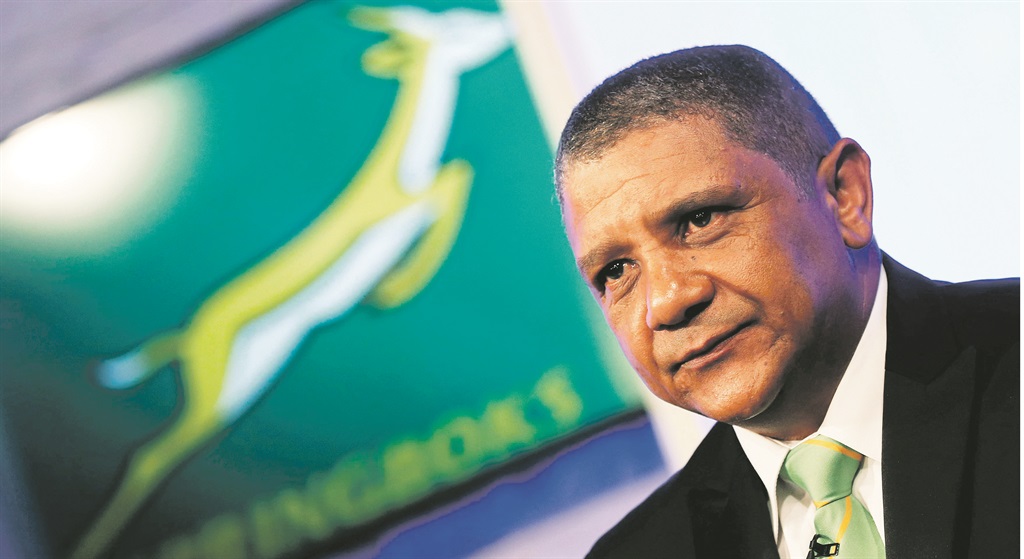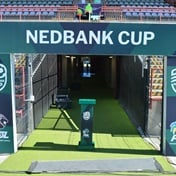
New Bok coach says he’s grateful he’s had to wait to drink from the ‘poisoned chalice’
“This is your time, Allister. And it’s the right time. Better now than earlier, when you wanted it so badly. You’re ready now. And that’s good.”
These were the thoughts that went through Allister Coetzee’s mind while he waited in the SuperSport studio to be officially announced as the new Springbok coach.
This was nearly the same feeling that Coetzee, as a cocky 13-year-old, experienced nearly 40 years ago when, in only his second rugby match (promoted from Under-13 B), he ran out on to the field for the Under-18 A side of the Mary Waters High School in Grahamstown.
“Our school was up on the hill and the rugby field was down in Lavender Valley. The first team always warmed up at the school and then walked down to the field. There was a corrugated iron fence around the field, but it was beautiful ... silver ... so it almost felt as if you were entering an arena like the Roman gladiators in that scenario.”
He remembers those days with a smile.
From an early age, Coetzee had the heart of a gladiator. He was a fearless but small scrum half against the Goliaths, those who know him from those days recall.
It couldn’t be any different – it’s in his blood. His father Flippie, a teacher, was a rugby legend in the Eastern Province in his day. In different times (or with a different skin colour) Philip Coetzee could have become a Springbok fly half.
He always told the young Coetzee: “Get it, Toetie, go for it.” And then, in Allister’s Standard 3 (Grade 5) year, Flip was killed in a car accident on his way to Port Elizabeth.
That’s exactly what his father would say to him today: “Go for it, Coach Toetie.”
Suddenly his eyes fill with tears for the father he lost so early.
“Sorry, man, I get quite sad because he’s not here in these wonderful days. Tsk, now I don’t even have a handkerchief or anything with me...” and then Rayaan Adriaanse, his media manager, pushes Montecasino’s box of complimentary tissues along the table to him. “Oh, look at that,” Allister grins, surprised. They probably knew...”
His father would have been “flipping proud”, he nods. “My biggest critic, for sure, but always constructive, as he always was. He knew when to be tough and when to have empathy. Like I am now with my players. Balanced.”
And then there are the three women in his life: his “Iron Lady”, Dianne, and two girls, Melissa “my soft eldest” and Marischka, who gave him points for his press conference.
“She called immediately and said that with everything that went so well, she was glad for the small mistakes, the bit of nerves, because it showed I’m human, not just a show-off.”
And then there’s his mother Elma, “the old lady”, as he calls her tenderly, who at 76 still lives all alone at 11 Currie Street, the house in which Allister grew up.
“I was 16 and she believed happily I was only playing school rugby. Then on Saturdays I would throw my rugby togs through my bedroom window and slip out to play club rugby. And I got home after the game with not a scratch, not even a grass burn.
“And if my older brother, Leon, heard from the other guys that I’d been playing, I was in for it. If he said ‘coffee’, my friend, I would have to be quick to ask how many sugars! Boy, did he blackmail me – otherwise he would tell my mother. Later, the franchise officials came to plead with her. ‘We’ll look after your boy, but please let him play.’”
And now her little Toetie is the Springbok coach.
“Oh, no, that nickname!”
He promised City Press stablemate Rapport that he would tell them what his nickname meant if the Stormers won the Super Rugby competition. But they never won.
Well, if the Springboks beat the All Blacks, would you tell us then?
“Let’s make it the Rugby Championships – it’s easy to beat the All Blacks. No ... joke,” he adds quickly, amid loud laughter.
Then things become more serious, and the coach gives answers even before I ask: Absolutely, yes, it’s a poisoned chalice, this job as Springbok coach.
“But if no one wants to drink out of it, what then? Someone must do it.”
There was some doubt, yes. He hesitates for a second. “Not quite doubt, but Saru [the SA Rugby Union] had to get certain things in place before I accepted.”
About which things, he is well aware: everything is about the record of wins. And, of course, transformation. “We must transform not only in terms of black players, but also in our thoughts.”
On a scale of one to 10, how does he measure the pressure on him to transform 50% of his team by 2019?
“Zero, at this stage. With the right players and people around me, it is feasible.”
And if the “right players” are white?
“At the Stormers, I did not select players and then put a cross next to the name – one black, two blacks, three blacks ... sherbet guys, that’s too little! No.
“I say that’s how we want to play; that’s what Cheslin Kolbe or Jesse Kriel brings, regardless of colour – it fits the pattern of play. In the end, we had 11 out of 23 black players at the Stormers. Without me counting, I promise. Each player knows why he is in the team, the contribution he must make.
“I come from the old school. I was on both sides of the fence and I have a vision for our rugby. We have the potential and, to tell the truth, that makes me excited.”
The image of Springbok rugby is in the hands of the coach. “A study shows the coach provides 64% of South African rugby’s image over a one-year period.”
His team must not only beat the All Blacks – he’s also the face of a union reeling from crisis to crisis.
“I have a responsibility to the Springbok team. Saru will handle the rest. I agreed I want [Mzwandile] Stick, and Johan van Graan’s experience will be invaluable going forward. Likewise Ian Schwarts ... it’s an exciting management team.”
But have Saru not already twisted Coetzee’s arm with his assistant coaches?
“That’s a half-truth. Saru is more than willing to accommodate me if I want to bring in someone I trust or a specialist. For me it’s about what can make the Springboks the best team.”
Matt Proudfoot perhaps? (His right hand at the Stormers, who went to coach with him in Japan.)
“Honestly, Matt has always been there and he’s a very good coach. At this stage, he still belongs to the Kobelco Steelers. It may not be the right time to talk about him yet.”
With the announcement of the new coach, Minister Fikile Mbalula, as usual, came late and then loudly proclaimed that Coetzee was not a “token” appointment.
But who asked?
He laughs deeply. Yes, that’s it, he says.
“I’m comfortable with my colour, but rather look at my 20-plus years of rugby experience. That’s what counts.”
It’s grass sticking to his rugby socks, this token business.
“But one grows, and, later, it falls off.”
His time at the Kobelco Steelers in Japan gave him a better perspective on South African rugby. “I actually needed it; it was a last step to being Bok coach.”
In Japan he learnt a few sentences of Japanese, but especially patience and respect. And that’s his message to South Africans: why would the Japanese team believe in him – want to achieve something for him?
“Because they started to believe in my core values. It united us. And that’s exactly what the Boks must do for me.”
Until they lose to the All Blacks? Then the coach’s head will roll, core values and all...
“Look, we must have respect for those who win consistently. But the Boks weren’t 10th or 12th – we are in the top three. We were three points from beating the All Blacks in the semifinal.”
And if we had won? “Then I wouldn’t be sitting here. It was that close.” He presses an index finger against his thumb.
He will now be looking carefully, to see which players do the right thing at the right time. “It has to do with good decision making, picking the right options; that’s what I’m going to look for.”
Week one, and already he is being criticised for his boring, stagnant playing style at the Stormers, and how Gert Smal was brought in for a bit more excitement. Is this going to be Bok rugby’s dull fate?
“Where were Western Province and the Stormers before that boring rugby? Statistics do not lie, right? It’s true we played in a certain way. But at the same time, I want to move on and grow as a coach.”
Will the fear of losing stop him from renewal?
“I do not operate under fear, and it should be anything but the players’ motivation. As the game develops, you as a coach must also develop. And you must also make sure you get the type of player who brings this new dimension to your game – gradually. I will never throw the baby out with the bathwater.”
Unique to the team, he stresses again, is its physicality. It will not help if they run around until they’re blue in the face and throw the ball around and then get licked.
“It may look nice, but it’s not test rugby. That’s why they call it that. It tests you in all aspects.”
He takes a deep breath. He says he understands people’s frustrations.
“The basic components of the game remain the set pieces, kicking game, defence. The fourth is attack, but it must remain in balance. We must improve the first three, otherwise you attack all the time but your opponents score 20 tries against you.”
Now Coetzee has his Springboks and must get them all in line with one another, with shared thinking and understanding each other clearly.
And it feels much better than eight years ago ... and four years ago, he admits with a broad smile. “I’m grateful I could walk the path and learn from others, and from my own mistakes. And the great thing: I could remain my own person.”
After the photos, he walks back quickly. He has something to add. “You know, my father always told us as children that he would never be able to write books one day – he was just a teacher – but he wanted his children to be his book to tell his story.”
A distant look comes into his eyes.
“I am now starting with my most important chapter...” – Rapport




 Publications
Publications
 Partners
Partners








